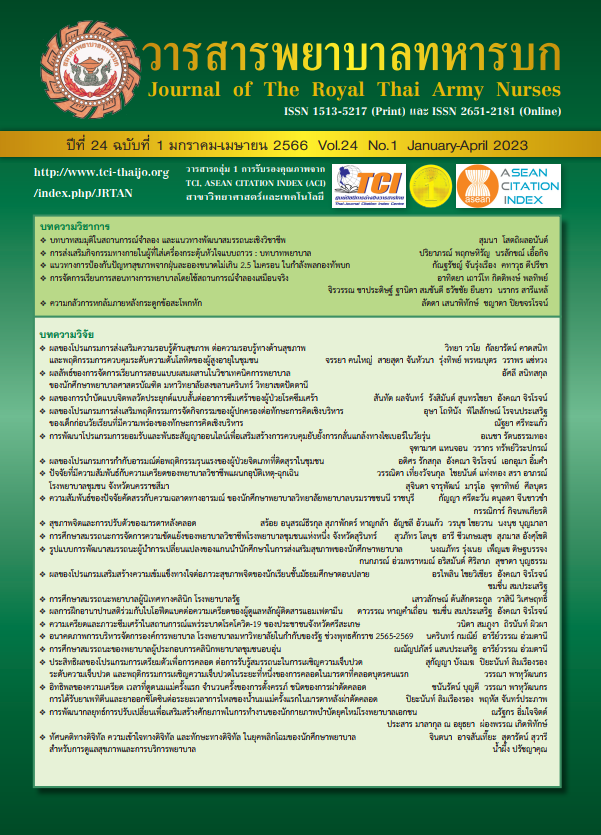Digital Competency of Newly Graduated Nurses
Keywords:
Graduated nurses, Digital competency, SatisfactionAbstract
The descriptive study was conducted to examine level of the digital competency and stakeholders satisfaction of the digital competency of newly graduated nurses. The sample were 65 stakeholders of graduated nurse in the 2020 academic year and worked from public and private hospitals. Data were collected by questionnaire. The questionnaire was analyzed content validity. The index of item-objective congruence were 0.53-1.00 the Cronbach’s Alpha Coefficient were 084. Descriptive statistics analysis were used in this study.
The result showed that 1) the digital competency of newly graduated nurses was moderate level when separate parts of the digital competency: it was found that the Digital skill with the highest mean (x̅ = 3.35 S.D. = 0.61) followed by the digital literacy (x̅ = 3.07 S.D. = 0.61), the adaptive digital transform in nursing (x̅ = 2.90 S.D. = 0.74) and the problem solving in nursing with digital tools (x̅ = 2.88 S.D. = 0.71) 2) the stakeholders satisfaction of the digital competency of newly graduated nurses was moderate level (x̅ = 3.07, S.D. = 0.70), when separate parts of the satisfaction digital competency it was found that the most satisfaction was digital skill with the highest mean (x̅ = 3.52, S.D. = 0.70), followed by the digital literacy (x̅ = 3.00, S.D. = 0.69), the adaptive digital transform in nursing (x̅ = 2.94, S.D. = 0.96) and the least satisfaction was the problem solving with digital tools (x̅ = 2.82, S.D. = 0.68)
Downloads
References
Office of the National Digital Economy and Society Commission Ministry of Digital Economy and Society. Digital competence framework for Thai Citizens. 2018. (in Thai).
Akkadechanunt, T. Nurses’ Competency and Public Healthcare Innovations in Thailand 4.0 Era. Journal of Thailand Nursing and Midwifery Council. 2019; 34(1): 5-13. (in Thai).
Nursing Office. Guidelines for organizing nursing information systems in hospitals. Nonthaburi: Thepphenwanich. 2013. (in Thai).
Thangkratok, P. A study of digital competency components of Thai professional nurses. Nontaburi School of Nursing, Sukhothai Thammathirat Open University; 2018. (in Thai).
Wongyai, W., & Patpho, M. Digital Competency. Bangkok: Graduate School, Srinakharinwirot University; 2021. (in Thai).
Office of The Higher Education Commission. Announcement of the Higher Education Commission on Guidelines for Compliance National Higher Education Qualifications Framework for Digital Competencies for Bachelor Degrees. Bangkok: Office of the Higher Education Commission. 2018. (in Thai).
Thangkratok, P., Cheevakasemsook, A., & Angsuchoti, S. A Confirmatory Factor Analysis of Digital Competency of Thai Professional Nurses. Journal of The Royal Thai Army Nurses. 2019; 20(3): 276-85. (in Thai).
Aunggurpakkarawat, A., Aree, P., & Singchungchai, P. Nursing Informatics and Digital Competencies ofFirst-line Nurse Managers in Tertiary Level Hospitals. The Journal of Faculty of NursingBurapha University. 2022; 30(1): 113-25. (in Thai).
Chusriying, S. Selected factors influencing professional nurse’s information technologycompetency in Community Hospitals, Regional 12 under the Ministry of Public Health, Thailand [Thesis]. Khon Kaen: Graduate School, Khon Kaen University; 2000. (in Thai).
Likert, R. The human organization: its management and value. New York: McGraw-Hill; 1967.
Jobst, S., et al. Competencies and needs of nurse educators and clinical mentors for teaching in the digital age a multi-institutional cross-sectional study. Biomed Central Nursing. 2022; 21: 1-15.
Ratcha, K., & Volrathongcha, K. Competencies of Nursing Informaticians Working in Community Hospitals in the Northeast Region of Thailand. Journal of Nursing and Health Care. 2019; 37(4): 100-8. (in Thai).
Downloads
Published
How to Cite
Issue
Section
License
Copyright (c) 2023 Journal of The Royal Thai Army Nurses

This work is licensed under a Creative Commons Attribution-NonCommercial-NoDerivatives 4.0 International License.
บทความหรือข้อคิดเห็นใดใดที่ปรากฏในวารสารพยาบาลทหารบกเป็นวรรณกรรมของผู้เขียน ซึ่งบรรณาธิการหรือสมาคมพยาบาลทหารบก ไม่จำเป็นต้องเห็นด้วย
บทความที่ได้รับการตีพิมพ์เป็นลิขสิทธิ์ของวารสารพยาบาลทหารบก
The ideas and opinions expressed in the Journal of The Royal Thai Army Nurses are those of the authors and not necessarily those
of the editor or Royal Thai Army Nurses Association.






